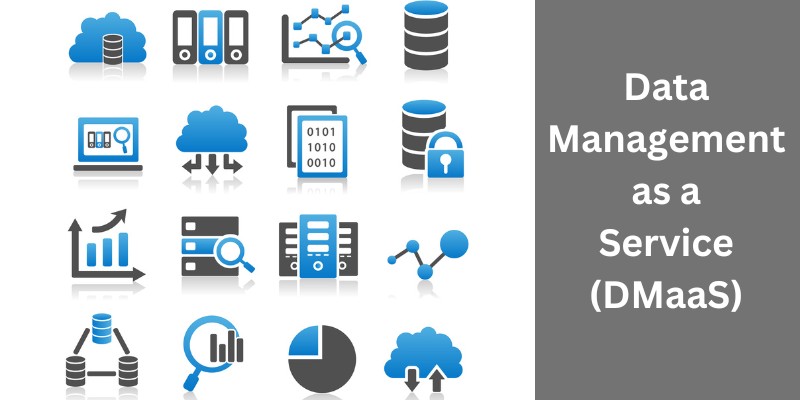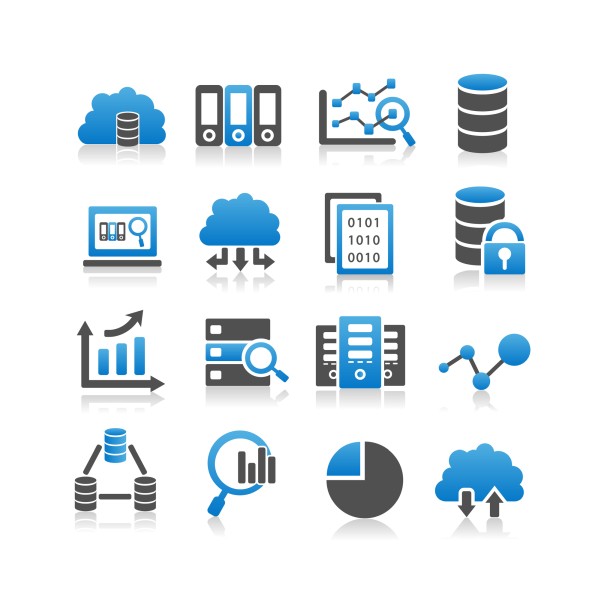For years, businesses all over the world have looked to utilize cloud-based IT services to their advantage. That has caused an explosion in the number of cloud service providers, as well as acronyms that describe their offerings.

Today, it’s common to see examples of Software as a Service (SaaS), Platform as a Service (PaaS), and even Infrastructure as a Service (IaaS) providers in industries of all kinds.
Lately, however, more businesses have started to turn to something called DMaaS.
It stands for Data management as a Service, and it’s fast becoming an indispensable tool.
Here’s what DMaaS is, what it provides the businesses that use it, and some of the leading DMaaS providers in the market today. Let’s get right to it.
What Is DMaaS?
Data Management as a Service, or DMaaS, refers to a grouping of services related to the management of enterprise data.
It includes services like data backup and recovery, data governance, security, analytics, and more.

A DMaaS provider offers those capabilities within a single cloud-based platform as a plug-and-play solution for businesses to adopt.
Critically, businesses can access DMaaS services based on their specific data needs.
That means they can access a suite of services customized for their use without paying for unnecessary functionality.
The provider simply bills the business based on its monthly, quarterly, or yearly usage.
What Are the Benefits of DMaaS?
These days, the collection, protection, and operationalization of data is a business imperative.
By using data in the right ways, businesses can make better, faster, and more profitable decisions. However, collecting and storing certain types of data does come with some risks.
For one thing, the risk of losing control over customers’ private data can create an existential crisis for any business.
According to some statistical analyses on the matter, as many as 1 in 8 businesses will shut down permanently after suffering a data breach. That makes maintaining data security a high priority for any organization.
For another, developing the right data infrastructure can cost significant amounts of money, adding to a business’s overhead.
If those investments don’t pay off, they can become a major drain on a business’s bottom line. That means the use of data—if executed badly—can do significant damage to a company.
DMaaS alleviates some of those problems in a few ways. First, it offers businesses the ability to limit their capital risk via a pay-as-you-go billing structure.
And, it allows a business to outsource some of the more difficult data security and provenance issues to a provider that specializes in the work.
Those benefits are only the beginning, however. DMaaS services also confer a variety of other benefits to the businesses that rely on them. Those benefits include:
- Faster technology upgrade cycles, providing faster access to new feature sets and data technologies.
- A reduced need for on-staff technical expertise to operate and manage data infrastructure, reducing staff overhead.
- Centralization of a business’s data management infrastructure, reducing siloing and sprawl.
- Improved data quality and accuracy via better management tools and techniques.
- Direct access to analytics tools to use data on-platform.
- Easier paths to achieving regulatory compliance.
- Greater business agility via the ability to access new data management features with less lead time.
In other words, DMaaS takes some of the uncertainty out of using data to the fullest. It also dramatically lowers the barriers to entry by all but eliminating up-front infrastructure costs.
What Are the Main DMaaS Use Cases?
Of course, not every business needs or should use a DMaaS solution. It only makes sense for businesses that haven’t already invested in a large data infrastructure of their own or for those that already have data stored in a multi-cloud environment.
Also, businesses that aren’t presently using data in their operations but have plans to do so in the future are good candidates for using DMaaS.
Some specific use cases make DMaaS use a good idea. For businesses that need them, a DMaaS can speed up and simplify their planning. The main use cases of DMaaS platforms include the following:
Data Backup, Retention, and Disaster Recovery
DMaaS platforms make data protection easy via their built-in data backup, retention, and disaster recovery functionality.
For businesses that have data that, if lost, would harm their ability to continue operating, DMaaS is an excellent option.
Data Compliance Requirements
Not every business operates in an industry or region governed by specific data handling and use regulations. But for those that do, the use of a DMaaS platform is beneficial.
Businesses, for example, that must comply with the EU’s GDPR directive, California’s Consumer Privacy Act, or Canada’s Personal Information Protection and Electronic Documents Act, can reduce their costs of compliance through the use of a DMaaS platform.
Multi-cloud Data Operations
Businesses with complex data operations spanning multiple cloud providers can also benefit from the use of DMaaS.
By centralizing all data management through a single solution, businesses improve data visibility and reduce their reliance on a patchwork of platform-specific management tools.
Development Environment Portability
Businesses that require software development environments that depend on data can also benefit from using DMaaS.
They can, for example, grant developers using a development environment within a private cloud access to needed data.
Then, when software development completes, those access rights transfer seamlessly when the project migrates to a public cloud for wider use.
Who Are the Major DMaaS Providers?
Although the concept of DMaaS is relatively recent, there are already a variety of providers worth highlighting in the market.
Some of the most well-known data firms in the world, including Tableau, Rubrik, and Druva, have jumped into the market recently.
Beyond those, there are also a variety of providers that specialized in cloud services prior to moving into DMaaS. They include the following providers (not an exhaustive list):
Cohesity
Cohesity is an Amazon Web Services Advanced Technology Partner that offers a DMaaS solution called Helios.
It’s an all-encompassing platform that’s compatible with almost all major public clouds as well as on-premises private cloud infrastructures.
They’re one of the original innovators in the DMaaS space and still dominate a large part of the market.
2nd Watch
2nd Watch is a cloud services provider that’s been operating since 2010. They’ve also recently launched a new DMaaS offering called DataOps.
Their DMaaS solution is somewhat unique in that it’s designed to work in concert with 2nd Watch’s data consultants, who handle onboarding and data preparation tasks for customers.
Their platform is also interoperable with all of the biggest public cloud providers on the market.
M247
M247 is another well-known provider of DMaaS. They boast one of the biggest global network footprints of any company in the market.
And their solution is one of the more flexible on offer, with options ranging from a la carte service provisioning all the way to complete data management outsourcing.
The Takeaway
DMaaS providers represent the vanguard in a growing new type of cloud service offering built to suit the needs of modern businesses.
And, as many cloud-focused, acronym-represented services have before it, DMaaS will soon become a go-to solution that countless industries depend on.
Of course, those with the foresight to take advantage of it early on will reap the greatest rewards. And now you, the reader, armed with this knowledge, can become one of them.
Leave a Reply